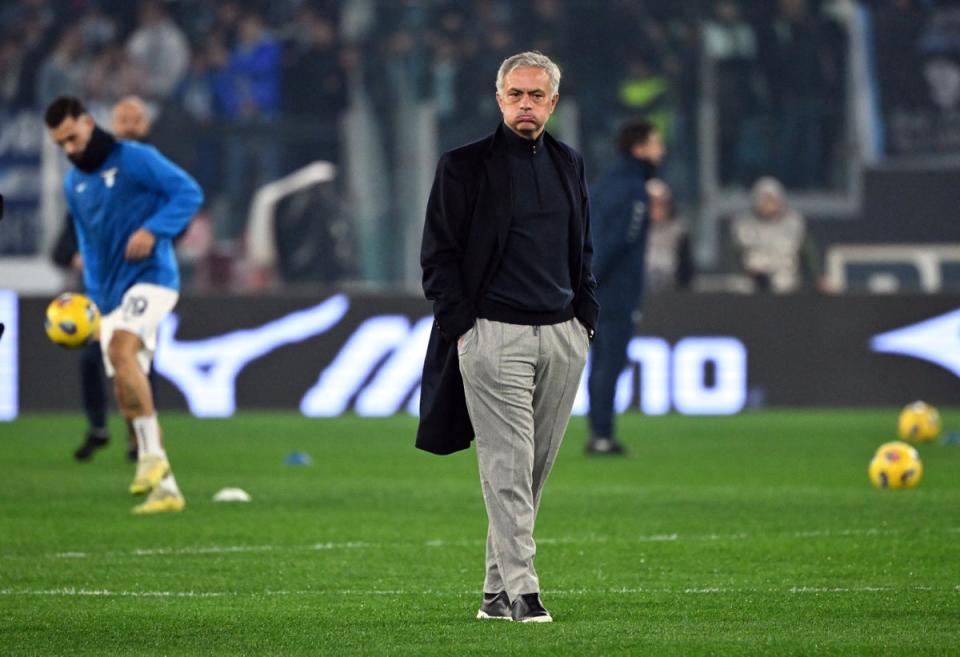The trend that exposed Jose Mourinho as yesterday’s man

The two announcements were separated by about 12 hours. At the Best Fifa Football awards, Pep Guardiola was named the world’s outstanding manager now. Then the man who was supposed to be his nemesis was sacked by the club ninth in Serie A.
Jose Mourinho can always say that he won the first European trophy Roma secured in their history – and being Mourinho, he probably will – but he was dismissed with them nearer the foot of the Serie A table, in terms of points, than the top.
Guardiola is the reigning Champions League winner; it will soon be the 10-year anniversary of the last time Mourinho won a Champions League knockout tie. He has been exiled from the competition that used to define him, partly by his own results: Roma had four top-four finishes in the six seasons before Mourinho’s appointment. They came sixth and sixth – which would have been seventh but for Juventus’ points deduction – under him and he left them in mid-table.
Mourinho’s status as an all-time great was cemented long ago, but he is not a great manager now.
But he does retain a magnetism. With his gift for making headlines, the 60-year-old said last week that people seemed to think his full name was “Jose Harry Potter Mourinho”. The recent magical managerial achievements in Italy, however, have come from others.
From Luciano Spalletti, taking an unfancied Napoli team to their first Scudetto in 33 years. From Simone Inzaghi, inheriting an Inter Milan side depleted by sales and steering them to a Champions League final. From Thiago Motta, perhaps, who could take Bologna into European elite: that Bologna beat Roma and are above them means a Mourinhista, a stalwart of Mourinho’s Inter, outperformed Mourinho.
It was a symbolic way of suggesting he is yesterday’s man. Similarly, Roma can hope his successor, their former captain Daniele de Rossi, two decades the Portuguese’s junior, represents the future.

Sometimes Mourinho has spent his time raging against the dying of the light. Or raging, anyway. He collected two red cards in four days earlier this month, three – more than any player – in Serie A last season. For some, the abiding memory of his time at Roma will be of him calling referee Anthony Taylor a “f***ing disgrace” in a car park.
And if such antics helped Mourinho construct a siege mentality, with the willing assistance of many Romanisti, who bought into his antics, he can at least argue he was only in a car park with Taylor because it followed a Europa League final he reached. If the greatest low of Mourinho’s two-and-a-half years in the Italian capital came in continental competition – a 6-1 thrashing by Bodo Glimt stands out as his worst-ever result – so did the highs: the Conference League triumph in 2022, albeit in a weak competition, the progress beyond RB Salzburg, Real Sociedad, Feyenoord and Bayer Leverkusen for the Europa League meeting with Sevilla in May.
Yet the game itself was horrific, a 146-minute epic of anti-football, of whingeing to officials and attempting to get opponents sent off. It felt Mourinho had stamped his ethos on an awful evening. The broader problem was that his Roma were not good enough at actual football.

Mourinho played the blame game in characteristically one-eyed fashion, complaining about two seasons of austerity without fully acknowledging they were necessitated by his own net spend of €100m in the summer of 2021 and subsequent failure to qualify for the Champions League, open as Serie A has been.
The current campaign has offered an indication why. Mourinho, once the supreme big-game manager, had become a small-game manager.
Roma have beaten Napoli but lost twice to AC Milan, once each to Inter, Juventus, Bologna and Lazio. Mourinho lost four and won just one of his six Rome derbies. Over three seasons, he lost more than he won against each of Milan, Inter, Juventus, Napoli and Lazio. He underachieved with underwhelming football: last season, Roma scored just 50 Serie A goals, their lowest tally for 26 years.
He can still make headlines; just not the capacity to win leagues. Mourinho has not lost his charisma, his quotability but a sourness can be too obvious, a willingness to reach for excuses too apparent. If his powers are declining, his addiction to management may not be.
Each setback and each sacking does not finish him off. He claimed in the summer that he had rejected a vast offer to go to Saudi Arabia. It is easy to imagine another materialising for a manager whose past and fame dictate that he would be seen as a trophy asset for the Saudis.

Perhaps Carlo Ancelotti’s contract extension with Real Madrid could open a path to the Brazil job, to a post that offers more idealism and the chance to win a World Cup, could afford Mourinho an opportunity to get the kind of achievement that would allow him to finish on a high.
But it is ever harder to see the major European clubs turning back to him. Rome may be the Eternal City but two-and-a-half years there were further evidence Jose Mourinho’s true glory days are ever further in the past.

